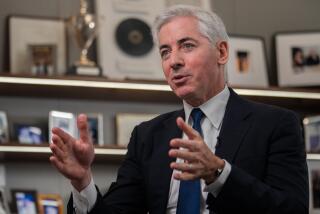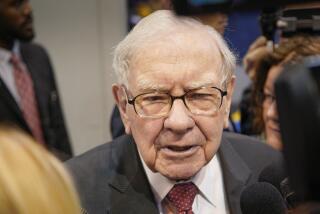Beckman at 90
- Share via
Even at 90, Arnold Orville Beckman, Orange County’s pioneering giant of science, industry and philanthropy is not impressed with longevity.
“Longevity as such doesn’t interest me,” says the founder and chairman emeritus of Beckman Instruments. “No, it’s the quality of life. . . . “I think some doctors are overemphasizing merely prolonging life. It’s what kind of a life are you prolonging. That’s the important thing.”
Beckman, who turned 90 on April 10, will be honored Saturday at a luncheon for 200--the latest in a series of celebrations--given by Allergan Inc. Chairman Gavin Herbert and his wife Ninetta at the couple’s home, Casa Pacifica, the former Western White House in San Clemente. Celebrating with him have been his two children, land developer Arnold Stone Beckman of June Lake and Patricia Beckman of Denver, a registered nurse, and two grandchildren. His wife, Mabel, with whom he shared “64 years of happy married life,” died last June.
While not reclusive, Beckman rarely sits for interviews. Recently, however, he reflected on a life that made him one of the county’s best-known residents and gave him stature in the international science community.
On this occasion, he was sitting behind his desk at the Beckman Conference Center of the National Academy of Sciences, on the edge of the UC Irvine campus, where he can usually be found tending to the business of the Arnold O. and Mabel Beckman Foundation.
His step has slowed some in recent years, he seems thinner and he now relies on two hearing aids, but his mind is sharp and his eyes shine.
Ever the scientist, he acknowledged that longevity is partly a function of genetic roulette.
“My mother died when she was 37, my father when he was 84, and his mother--my maternal grandmother--lived to be 94. So you can take your choice.”
Now officially retired from Fullerton-based Beckman Instruments--although he does attend board meetings--Beckman pointed to a stack of scientific journals on his desk. His secret for remaining mentally active?
“I try to keep up in developments in the biochemical area. In the new recombinant DNA. I try to read ‘Science’ to get a broad view and ‘Scientific American,’ ” but staying abreast of all the scientific breakthroughs is “a losing proposition.”
There are, he says, “so many interesting things going on, I don’t see how people can find life dull. My problem has been to pick out what’s the most interesting.”
Beckman was born in 1900 in Cullom, Ill. (population 500), the son of a blacksmith. He grew up as a classic back-yard tinkerer. At the age of 9, after being “fascinated” by the Wright Brothers first flight the year before, he found an 1861 edition of “Steele’s Fourteen Weeks in Chemistry” in the family attic, and the rest is history.
For his 10th birthday, his father built him a back-yard shed for a laboratory, and his first attempt at instrument making ended when an empty pickle jar shattered over a flame.
After stateside service as a Marine during World War I, he earned bachelor’s and master’s degrees in chemistry at the University of Illinois, then went on to Caltech for a Ph.D. in 1928 and a place on the faculty.
In 1934, in order to earn some “pin-money” to supplement his faculty salary, he and some colleagues founded a company they called the National Inking Appliance Co. in the rear of a Pasadena garage.
A year later came the breakthrough with the development of the pH meter for Sunkist. This “acidimeter” enabled Southern California citrus processors to gauge the level of acidity in lemon juice.
That device became a widely used tool for analytic chemistry and was followed in 1940 by two equally profitable inventions used for precision scientific measurements, the Beckman DU Spectrophotometer and the Helipot, which was an essential component of early World War II radar systems.
National Inking became National Technical Laboratories, which ultimately became Beckman Instruments--although not without bad feelings from several angry ex-partners and employees. For much of the 1980s, the company was part of the SmithKline Co., but since 1989 it has been independent.
Beckman does not take all the credit for his success. “I’ve been lucky in many things,” he said. “I’ve been lucky in the way the company’s grown over the years. Lucky in the type of people we have. We have a fine group of employees.”
He is proud, he says, of “having founded and built (a company) that turned out to be an agency that did a lot of good for mankind, (developing) instruments to advance medical and chemical research. And it provided job opportunities for a lot of very fine people.”
An early activist in the fight against air pollution, Beckman is a firm believer in the connection between excitement, efficiency and productivity.
“People should have the right job,” he said. “If you’re enthusiastic about what you’re doing, you’re probably in your right job. If you’re not enthusiastic, you ought to change.”
Speaking at a reception for longtime employees earlier this month, Beckman recalled that “when we were a little smaller, I used to talk to the employees from time to time. And one thing I used to say was, ‘Don’t be afraid of making mistakes. If you’re not making mistakes, you’re probably not doing very much. You don’t have to repeat the same mistake. And there’s one mistake you must never make, and that is, make me ashamed.’ And that has been lived up to, so that I am not ashamed of anything the company has done.”
Beckman, whose shares in the company at the time of its sale were worth an estimated $200 million to $500 million, said he has found in recent that “it’s harder to give money away intelligently and wisely than it is to make it.” He takes his philanthropy seriously and personally, operating the foundation on a shoestring, out of a single office with one paid staff member.
To date, the Beckman Foundation has given about $200 million in grants, much of that in the past five years. Beckman explained to one university gathering that “Mrs. Beckman and I decided quite some ago to focus our energies on the advancement of science in such areas as medicine and biotechnologies. However, we also realized that for science to serve the human race, programs must be in place to manage these new technologies,” in particular to shorten the time between research breakthroughs in academia and practical applications.
Beckman has also voiced an interest in ethical issues raised by such developments as genetic engineering and artificial intelligence. Progress in such areas, he said, requires “getting public acceptance of some of these changes.” Sometimes, a “mixture of religious belief and fear” can slow down these kinds of advances. “We need to keep the general public informed and educated.”
In an earlier interview, Beckman provided a philosophical insight into his theory of philanthropy, consistent with the county’s Republican Lincoln Club, which he helped found and served as chairman: “I’ve been fortunate enough to accumulate more money than Mrs. Beckman and I will need for the rest of our lives. So, what do you do with the surplus? . . . Either we dispose of it ourselves or it gets handed over to our estate and the government gets it. I think Mrs. Beckman and I can be a little more effective than the bureaucrats in Washington.”
There are numerous monuments that testify to that philosophy: the Beckman Laser Institute at UCI; the Beckman Management Center at Pepperdine University; the Beckman Center for Molecular and Genetic Medicine at Stanford; the Beckman Institute for Advanced Science and Technology at the University of Illinois; the Beckman Laboratory at Scripps; the Beckman Vision Center at UC San Francisco; the Beckman Research Institute at the City of Hope; and the Beckman Institute and Laboratories of Behavioral Biology at Caltech.
In addition, there are chairs in chemistry named for Beckman at Caltech and Rockefeller University in New York.
There are Beckman chemistry chairs at Caltech and New York’s Rockefeller University.
The one gift Beckman recalls as his most meaningful was relatively modest. “The first philanthropic gift was the auditorium at Cal Tech. That really is probably one of the best because that was sorely needed, and it has proved to be much better than we anticipated, in that not only is it a place for students to gather, but it brought the community and Cal Tech together. Very great many community events (take place) in it now, so that was very satisfactory.”
Beckman has had his share of recognition. For his work, he has received a National Medal of Science from President Bush, the Presidential Citizens Medal from President Reagan and the National Medal of Technology. He is a member of the National Inventors Hall of Fame and was named the North Orange County YMCA’s Humanitarian of the Year. There is a Beckman Playground in Fullerton and even a short Beckman Avenue in Irvine.
And just how long does the longtime Corona del Mar resident expect to be around--reading, tinkering, prodding, encouraging, giving away money?
“You’re starting a new decade,” he told his Beckman Instrument employees at the Disneyland Hotel. “I hope to be back here at the end of the decade and see how well you’ve carried out your obligations in the next 10 years.”
More to Read
Inside the business of entertainment
The Wide Shot brings you news, analysis and insights on everything from streaming wars to production — and what it all means for the future.
You may occasionally receive promotional content from the Los Angeles Times.










